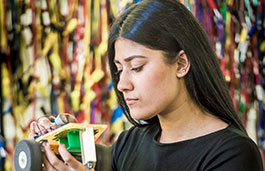Search
Embedded Systems Engineering MSc
Study level: Postgraduate
Embedded systems are computing devices that perform dedicated functions or are designed for use with specific embedded software applications.
Year of entry
2024-25
Location
Coventry University (Coventry)
Study mode
Full-time
Part-time
Sandwich
Duration
1 year full-time
2-3 years part-time
2 years sandwich
Course code
EECT040
Start date
September 2024
Course overview
This course will provide you with the opportunity to develop practical skills and theoretical knowledge in embedded systems engineering, including embedded systems programming, embedded operating systems, and embedded hardware engineering as well as advanced electronics including Field Programmable Gate Arrays (FPGA) based on digital system design, image and signal processing, digital communications, wireless intelligent systems, and robotics
- Embedded systems engineering is a discipline that designs and implements hardware and software of embedded systems. To name a few, they are crucial to mobile communications, Internet of Things (IoT), household robots and video game consoles.
- The course is designed for graduates with an electronics and computing background. It can provide a leading-edge MSc degree education in embedded systems engineering.
- The technical focus of the course concentrates on a combination of advanced electronics including FPGA based on digital system design, image and signal processing, digital communications, wireless intelligent systems, and robotics as well as the subject-specific knowledge in embedded systems including embedded systems programming, embedded operating systems, and embedded hardware engineering.
- An emphasis on applied technical work can strengthen the engineering development skills of students from an academic background. Such work can provide the demonstrable expertise necessary to help secure professional-level employment in related industries.
- You will have the option to apply for a ‘professional work placement’ opportunity2, designed to further develop your skills and knowledge with the aim of maximising your employability prospects. See modules for more information.
Rated Gold Overall
Teaching Excellence Framework (TEF) 20235 QS Stars for Teaching and Facilities
QS Stars University RatingsTop 5 Student City in England (Coventry)
QS Best Student Cities Index 2025Why you should study this course
At Coventry University, we believe that studying engineering should be so much more than just learning theory and passing examinations. Our activity-led learning approach should enable you to develop your skills and knowledge by working on real-life problems and projects, some commissioned by our industry collaborators.
- Designed to follow the Engineering Council UK-SPEC standard, the course encompasses theoretical and practical subjects within the broad area of embedded systems engineering as used by industries as diverse as mobile communications, IoT, household robots and video game consoles.
- We aim to regularly update course content to reflect emerging trends and knowledge fields to enrich your technical and transferrable skills. For example, embedded hardware engineering provides knowledge and experience of the engineering techniques and processes required for the realisation of embedded hardware systems. Robotics is another key area, so we will examine the sub-systems that a robot needs, such as sensors to perceive its environment, cognition to make informed decisions, image processing to ‘see’ and detect objects in the real world and the mechanics to enable movement through 3D space.
- You’ll study in our modern Engineering and Computing buildings, with access to extensive facilities4 and modern technologies in the fields of electrical and electronic engineering, such as a new machines and microprocessors laboratory.
- You’ll be taught by experts in their field, some of whom are currently active researchers in areas that include but are not limited to wireless sensors and pervasive computing, and embedded micro-electronics. This not only helps to inform your teaching, keeping you abreast of new developments and issues, but also provides opportunities to partner staff on research projects (subject to availability, staff are subject to change).
Accreditation and professional recognition

Chartered Management Institute
As part of this course you will undertake a professional development module which is currently accredited1 by the Chartered Management Institute (CMI) for the 2024-25 intake. Upon successful completion of the module, you will gain the CMI Level 7 Certificate in Strategic Management and Leadership Practice at no additional cost. Further details can be found under the modules and on the Professional Development module homepage.
Coventry University’s accreditation with CMI is currently ongoing for the relevant modules and is regularly reviewed and monitored by the CMI through their quality systems. Please visit the CMI website for full details on the CMI accreditation.
What you'll study
One half of the course concentrates on areas such as embedded hardware engineering, wireless intelligent systems, signal processing and robotics. The other half examines areas such as embedded operating systems, embedded system programming, digital system design, communications systems, and consultancy.
Ultimately, you will be required to perform a detailed research or design study with the help of an experienced supervisor into a technical aspect from the course. With the agreement of your tutor, you can choose a topic to suit your interests, research to assist your career aspirations or a practical project. As an example, one former student worked on a project commissioned by RTF Europe to develop a recoiler unit for mobile phone display security in shops.
With work placement pathway
The ‘With Work Placement’ opportunity2 enables you to apply in semester 1 for an optional work placement of up to 12 months, extending the duration of your master’s to 24 months. The placement provides an opportunity for you to develop expertise and experience in your chosen field with the aim of enhancing your employability upon graduation. The placement would take place in semesters 3, 4 and 5.
Please note that the optional placement modules will incur an additional tuition fee of £4,000. Placement opportunities may also be subject to additional costs, visa requirements being met, subject to availability and/or competitive application. Work placements are not guaranteed but you will benefit from the support of the Talent Team in trying to find and secure an opportunity. Find out more about the work placement option.
We regularly review our course content, to make it relevant and current for the benefit of our students. For these reasons, course modules may be updated.
How you'll learn
Your course will be taught using traditional teaching methods such as lectures, with associated seminars, tutorials and practical laboratory classes. We also incorporate a range of innovative teaching methods, including flipped classroom, activity led learning and peer-based learning which you will undertake both individually and in groups.
Throughout your studies, you will have access to our modern facilities4; computers are installed with all the relevant computing software, ranging from the basics such as Matlab and Xlinix ISE to more subject-specific, like VREP (Virtual Robotic Environment Platform), Flux Electromagnetic and Thermal Finite Element Analysis software.
You may be provided with opportunities to sit in on guest lectures and take part in optional field trips2 which have previously included industry visits to BT, GE, Electric Mountain, National Grid and UNIPART to view current industrial practices. Some of our past students have also taken part in local IET competitions, such as ‘Present Around the World’ where they must present a topic that interests them for 10 minutes and be able to answer questions on it.
This course can be offered on a part-time basis. Whilst we would like to give you all the information about our part-time offering here, it is tailored for each course each year depending on the number of part-time applicants. Therefore, the part-time teaching arrangements vary. Request further information about part-time study.
Teaching contact hours
The number of full-time contact hours may vary from semester to semester, however, on average, there is around 30 hours of contact time associated with each module.
Additionally, you will be expected to undertake significant self-directed study of approximately 35 hours each week, depending on the demands of individual modules.
The contact hours may be made up of a combination of face-to-face teaching, individual and group tutorials, and online classes and tutorials.
As an innovative and enterprising institution, the university may seek to utilise emerging technologies within the student experience. For all courses (whether on-campus, blended, or distance learning), the university may deliver certain contact hours and assessments via online technologies and methods.
Since COVID-19, we have delivered our courses in a variety of forms, in line with public authority guidance, decisions, or orders and we will continue to adapt our delivery as appropriate. Whether on campus or online, our key priority is staff and student safety.
Assessment
This course will be assessed using a variety of methods which will vary depending upon the module. Assessment methods include individual and group work, presentations, laboratory work, formal examinations, technical reports, in-class tests, online quizzes, posters and computer simulation employing Simulink, Matlab, Multisim and PSCAD.
The Coventry University Group assessment strategy ensures that our courses are fairly assessed and allows us to monitor student progression towards achieving the intended learning outcomes.
Entry requirements
Typical offer for 2024/25 entry.
Fees and funding
2024/25 tuition fees.
| Student | Full-time | Part-time |
|---|---|---|
| UK, Ireland*, Channel Islands or Isle of Man | £11,200 | £4,000 (Work placement option additional fee) | Request fee information |
| EU | £11,200 | £4,000 (Work placement option additional fee) per year with EU Support Bursary** £18,600 | £4,000 (Work placement option additional fee) per year without EU Support Bursary** |
Not available |
| International | £18,600 | £4,000 (Work placement option additional fee) | Not available |
For advice and guidance on tuition fees3 and student loans visit our Postgraduate Finance page and see the university's Tuition Fee and Refund Terms and Conditions.
We offer a range of International scholarships to students all over the world. For more information, visit our International Scholarships page.
Tuition fees cover the cost of your teaching, assessments, facilities and support services. There may be additional costs not covered by this fee such as accommodation and living costs, recommended reading books, stationery, printing and re-assessments should you need them.
The following are additional costs not included in the tuition fees:
- Any optional overseas field trips or visits: £400+ per trip.
- Any costs associated with securing, attending or completing a placement (whether in the UK or abroad).
*Irish student fees
The rights of Irish residents to study in the UK are preserved under the Common Travel Area arrangement. If you are an Irish student and meet the residency criteria, you can study in England, pay the same level of tuition fees as English students and utilise the Tuition Fee Loan.
**EU Support Bursary
Following the UK's exit from the European Union, we are offering financial support to all eligible EU students who wish to study an undergraduate or a postgraduate degree with us full-time. This bursary will be used to offset the cost of your tuition fees to bring them in line with that of UK students. Students studying a degree with a foundation year with us are not eligible for the bursary.
Facilities
Our aim is to offer you sector-leading facilities4.

The Library
You will benefit from our support designed to help you succeed and our industry-relevant teaching and resources. These include our modern library and computing facilities, dedicated careers advice and Your Students’ Union.

Jaguar Centre
The Jaguar Centre has been specifically designed to provide facilities and services to support our postgraduate students including social spaces, computer suites and separate areas for small group study.

The Hub
The Hub is the centre of student campus life. It's also home to the Health and Wellbeing Centre, the Spirituality and Faith Centre, the Tank Studio, Student Success Coaches and the Enterprise Hub.
Careers and opportunities
Upon successful completion of this course, you will have knowledge of:
- Principles of embedded systems engineering and their relationships to leading-edge, real-world applications.
- Advanced analysis and design tools and processes relevant to embedded microelectronics and communications.
- The implementation and critical evaluation of design solutions through simulation and practical applications.
- The main approaches to research design, sampling and analysis appropriate to construct research questions or hypotheses.
You will be able to:
- Conceptualise complex technical aspects of embedded systems engineering.
- Conduct detailed and systematic technical analyses of aspects of embedded systems engineering.
- Devise technical solutions to problems in the design and implementation of embedded systems engineering.
- Critically evaluate literature and solutions relating to problems arising in the design and implementation aspects of embedded systems engineering.
- Select, apply and critically appraise tools and techniques of advanced analysis and design.
- Implement appropriate software and hardware solutions and simulations and critically evaluate the outcomes.
Embedded systems are now ever-present in all aspects of technological life – in industries as diverse as automotive, biotechnology, fixed and mobile communications, information technology, industrial electronics process control, security and computer technology.
There is a high demand for highly trained professionals to develop such systems or work in the vast number of industries that employ these technologies.
Where our graduates work
The specialist topics studied on the programme will help to prepare you for a wider range of roles in related industries that rely on the technology. To name a few, you can begin a career in the areas of consumer electronics industry, household robots, IoT, mobile communication devices and video game consoles. Other possible destinations include digital system design, robotics and associated activities and microelectronic applications.
Graduate Immigration Route visa
Based on current information from the UK Government, international students whose study extends beyond summer 2021 may be eligible for a visa under the UK Government’s Graduate Immigration Route, which will enable students to stay and work, or look for work, in the UK at any skill level for up to two (2) years. Check the most up to date guidance available to check your eligibility and any updates from the UK Government before making an application or enrolment decision.
How to apply
You may also like





